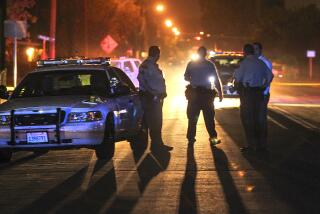Families of Crime Victims Share Grief, Resolve
Families of people who have been killed in violent crimes gathered in a hilltop chapel Sunday to receive words of consolation, sympathetic embraces and, finally, a political message: Overwhelming grief must become a catalyst to change the law.
About 125 people drove in a 30-car caravan to the Rose Hills Memorial Park in Whittier for the memorial service. The cars, adorned with red and black bows, shone their headlights in a procession that symbolized the scores of funerals that have become the common thread now uniting the participants in Sunday’s event.
Parents and siblings told horror stories, offering testimonials of how their relatives fell victim to violent crime.
Victims in Portraits
A 15-year-old boy was shot to death, allegedly by a transient in a church parking lot. A 21-year-old university student was killed by her ex-boyfriend. A senior at a Los Angeles high school is caught in the cross fire of gang guns.
Portraits of many of the victims, most reproductions of high school pictures, lined one wall of the chapel. One boy was photographed in his Little League uniform. Several in the audience wept through the service.
“The grief never subsides. The sense of loss strikes all of us,” said Colleen Davis, founder of the Whittier chapter of Parents of Murdered Children, one of several groups participating in Sunday’s ceremony.
Davis, whose 15-year-old son Ben was slain in 1979, is leading a campaign to erect a monument to victims of violent crime. Land at Rose Hills has been donated for the memorial, to be made of black marble and granite with small plaques commemorating each victim. So far, only $6,000 of a needed $35,000 has been raised.
Collene Campbell addressed the audience in the same chapel where a memorial service was held 5 weeks ago for her brother, off-road racing promoter Mickey Thompson, and his wife Trudy, both shot to death. Campbell, an outspoken advocate for victims’ rights, also lost a son to murder.
The Anger Shows
“We are very hurt and angry,” she said. “To look at the pain in all your faces, I’m even more angry.”
But she urged those present to check their grief long enough to fight for changes in the law so that convicted killers serve longer sentences and a victim’s interests are better represented in the courts. She plans to launch a petition drive for a victims’ rights ballot initiative.
“Let’s stand up and make a change,” she said. “If our children could talk to us, they’d say, ‘Come on, Mom and Dad, do something. Make them stop killing people. Make them stop coddling those criminals.’ ”
Movements to shore up rights for victims and their families have been spreading gradually throughout the country, appealing to people who believe the criminal justice system accommodates criminals more than victims.
The FBI estimates homicides in the United States rose 8.6% in 1986 over the previous year, to 20,613.
Source of Support
For many, victims-rights organizations, like Parents of Murdered Children, serve as a support network, where those suffering can call another member at any hour for help or comfort.
“If it hadn’t been for (the organization) I would not have survived. I had no will to survive,” said Hazel Brown of Fountain Valley, whose 26-year-old son and 12-year-old grandson were slain in separate incidents in 1985.
“You hate belonging, you really do. But they taught me two things: that you can cry without shame and laugh without guilt,” said Evelyn Edwards, who lost a 16-year-old son.
Another woman, Gertrude Pryor, who said her daughter was raped and killed two years ago, thanked members of Parents of Murdered Children for attending the accused murderer’s trial when it was too much for her to bear.
Sunday’s service attracted people from diverse parts of Los Angeles and Orange counties, illustrating what one woman said was the fact that violent crime can strike anyone.
“Homicide is not restricted to the so-called bad neighborhoods,” said Marcella Leach of Malibu, whose 21-year-old daughter, Marsy Nicholas, was killed in 1983. She is a member of Justice for Homicide Victims, based in Beverly Hills.
More to Read
Sign up for Essential California
The most important California stories and recommendations in your inbox every morning.
You may occasionally receive promotional content from the Los Angeles Times.











